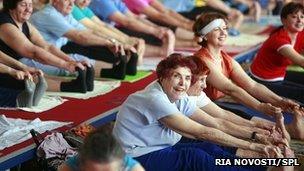'Few complementary therapies help arthritis'
- Published

Few complementary therapies appear to help musculoskeletal conditions like arthritis, say experts who have looked at the available trial evidence.
Most alternative treatments have either not been scientifically tested or subjected to limited investigations, says Arthritis Research UK.
Of 25 therapies, only a handful were judged to have enough medical evidence to support their use.
These included acupuncture, massage, tai chi and yoga.
Very little evidence was found in support of commonly-used therapies such as copper bracelets and magnetic therapy for arthritis, fibromyalgia or lower back pain.
For their analysis the researchers searched for randomised controlled trials - comparing the given therapy with a placebo, usual care or another treatment - that had been written up in English and published before the end of May 2011.
For arthritis, they found 53 trials of 14 different therapies among nearly 6,000 patients. Only tai chi and acupuncture appeared to work.
For fibromyalgia there were 50 trials of 17 different therapies in more than 3,000 patients. Acupuncture and massage came out top, closely followed by tai chi and relaxation therapy.
For sore backs, yoga and acupuncture appeared the most effective, and there was some evidence to also support the use of osteopathy and relaxation therapy as well as the Alexander technique which focuses on posture and movement.
Lower back pain was the most investigated condition, with 75 trials of 14 different therapies across over 11,600 participants.
According to the lead author of the report, Dr Gareth Jones from the University of Aberdeen, there is very little evidence for most complementary therapies.
"There's either no evidence that they're effective or there's some evidence that they are not effective.
"But there are some exceptions, like acupuncture and the whole body therapies like massage and tai chi, which do appear to work."
Waste of money?
Reassuringly, all of the therapies looked at are relatively safe with only minor side effects, even if they may not be effective, says Dr Jones.
But they could be a waste of money, he says.
Estimates suggest each year £250m is spent on complementary medicines, including supplements.
"This is an enormous cost for something without much evidence to show it works.
"People might be wasting their money.
"Some of these therapies are provided on the NHS."
He said the NHS should evaluate which alternative therapies it offers: "If there's evidence that something does not work they should take a serous look at whether they should be offering it."
Prof Alan Silman, of Arthritis Research UK, the charity which commissioned the report, said the findings would inform and empower patients.
"These treatments are things that patients make decisions about themselves and it is important that they have all the available information."
He stressed that a lack of evidence that a therapy worked did not necessarily mean it would be unhelpful for all patients.
"Different treatments work for different people. Some will get no benefit from a therapy while others might."
Terry Cullen of the British Complementary Medicine Association said: "I am not disappointed or surprised that a number of therapies did not indicate any apparent benefit - there are no treatment panaceas in any form of medicine."
He said there was insufficient funding available to carry out extensive and meaningful trials to prove the worth of alternative therapies.
"Slowly, but surely, complementary and alternative therapies are being recognised as a having health and well-being value," he said.
- Published27 May 2012